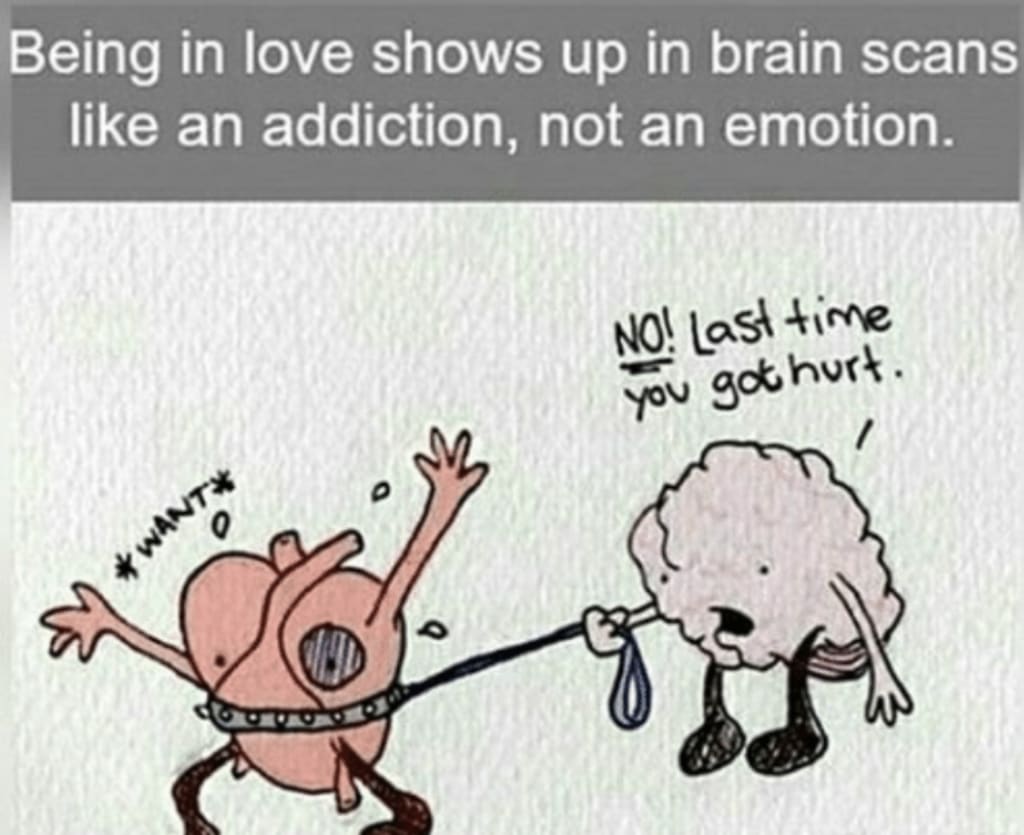The Psychology of Love
Is love an emotion or is it an addiction? This article will explain how love is processed through the brain, chemically, and how it can be more of an addiction rather than an emotion.

In many societies, especially in the western society, love, whether it is between a partner, family member, friend or animal, is present. It is seen as a necessity and want throughout each individual’s life. Love can help bring people together or tear people apart. It is something, an emotion if you will, that many societies wrap their livelihoods around. Neurochemically, love is defined as an array of different neurotransmitters centering around motivation and reward being released into an individual’s brain, causing an amazing sensation one feels for a person, place or thing. And when an individual cannot seem to find this sensation of “love,” they tend to look for it in other ways, such as using drugs that will sort of mimic the feeling one gets when in love. Even though love is so apparent in many societies, some scientists will argue that it is not a universal emotion. But all in all, individuals around the world have an extremely strong necessity for this sensation called, love. This paper will help individuals understand love by defining what love is chemically, how different drugs can mimic love, and if this “emotion” is universal.
The Brain on Love
When we think of love, it is an expression/emotion that is indescribable and unbearable. This is because when in a romantic relationship, the regions of the brain that are activated are associated with reward, desire, addiction, and euphoric states. These few feelings are all caused by a neuromodulator called dopamine, along with oxytocin, serotonin, and vasopressin. These three brain chemicals create the feelings of exhilaration and excitement when in a romantic relationship. The reason an individual in a relationship feels such a strong need and want for their partner is that every time these neurochemicals are released, it signifies a rewarded feeling for being with a partner. Therefore, one in a romantic relationship can be addicted to the person they are with and is the exact reason to why it is so hard to stop seeing or break up with the partner when things start to go rough.
When an individual is romantically in love or has a maternal love, the part of our brain that lights up is the reward system, mesolimbic pathway, located in the pituitary gland. Dopamine first is released by the hypothalamus, the part of the brain that connects the endocrine and nervous system, sending this chemical down the mesolimbic pathway and to the rest of the brain and body. When dopamine, oxytocin, serotonin, and vasopressin are released into the brain, they create such a satisfying feeling that does not only associate with the formation of relationships, but also during the sexual parts as well. These three neurotransmitters bond you and your partner to each other through sex, which is a rewarding exercise due to these few brain chemicals.
To provide evidence to the claim that romantic love is associated with the reward system, I looked at an article written by Helen Fisher and others. Helen Fisher is an anthropologist who studies human emotion and specializes in romantic love. In this article, Fisher studies ten women and men who have been intensely in love for one to seventeen months. She took MRIs of each participant's brain to see which part lit up when showed a picture or photograph of their beloved. In her results, she states that romantic love uses subcortical reward and motivation systems to focus on a specific individual, that limbic cortical regions process individual emotion factors, and that there is localization heterogeneity for reward functions in the human brain. This basically means that early-stage romantic love centers around the reward and motivation systems, causing a sort of obsession for one’s partner.
How Drugs “Mimic” Love
Romantic love does not always happen to everyone at the time that they need or want it. So to satisfy this craving, others turn towards different substances to “relieve the pain” of loneliness. But it turns out that some of these substances have a similar effect to on the brain. If that is true, who needs love, when you have a drug that can give you the same feeling without the romantic partner. But the questions are, how do these drugs mimic love and are they just as strong of a feeling?
Like I said in the previous section, romantic love releases dopamine, serotonin, oxytocin, and vasopressin, neurochemicals related to motivation, reward, and addiction. These same regions of the brain become active when different opioid drugs are ingested as well. Some example of drugs that induce states of euphoria and mimic feelings of romantic love are cocaine, crack-cocaine, MDMA (ecstasy), and methamphetamine.
The drug that is the closest to mimicking romantic love would be cocaine or crack-cocaine. During a clinical study in 2000, researchers took patients who were highly addicted to cocaine and gave them about 30 milligrams of the substance. But around two hours prior to the ingestion, the researchers had the participants take ecopipam to try and block certain effects of the drug. The results were promising and did block psychotropic tendencies that can be felt while high on cocaine. While doing this research, the scientists realized that there was a high level of dopamine running through the patient’s reward system of the brain (Koob). Therefore creating a feeling of euphoria, enhanced mood, heightened sexual interest, a feeling of increased self-confidence, greater conversational prowess, and intensified consciousness. Which are all the feeling experienced while an individual is in love. The same goes for crack-cocaine.
When it comes to ecstasy or MDMA and methamphetamine, the effect and feelings are similar to cocaine but more intense. When an individual ingests MDMA or smokes methamphetamine, it seems as though their senses are heightened, and “love” is coursing through their veins. Like cocaine and romantic love, ecstasy and methamphetamine cause increased sexual interest, enhances one’s mood, increased self-confidence, and overall heightened stimulation of nerves all over one’s body.
The two main chemicals released in the brain while on MDMA and meth is serotonin and dopamine, also the two main neurotransmitters released when an individual is in love and high on coke. When ingested, MDMA, specifically, oxidizes the blood and sends it to the brain. Where it tells the brain to release all of its serotonin and when that runs out, dopamine. Creating a feeling of intense LOVE and joy for everyone and everything. This feeling is so strong of a reward that many get addicted to it, the same way one can be addicted and obsessed with a romantic partner.
Now although cocaine, crack-cocaine, MDMA, and methamphetamine creates a feeling that romantic love gives an individual, does not mean it is safe. In fact, the safest and legal way to get the “high” from dopamine is to be in love.
Is love universal?
After talking about how an individual’s brain acts while in love, I would like to bring to attention the fact that some believe that this emotion is not universal. Although many “love” experts, such as Helen Fisher, see love in almost every society, how does the society that does not have love define it?
There are six main emotions that are universal: happy, sad, angry, and so forth. In the western culture, many would assume love to be on that list, but it is not. The reason to why many would think that is true is because of the market and media’s obsession with love, creating a picture for the western world that love is one of the most important emotions one can feel. They use romantic love to sell products, promote movies or ideas, and to define many big-named people. But in reality, there are some cultures where romantic love does not exist at all, according to Alison Jaggar.
In her article, Jaggar presents emotions as social constructs and compares love to knowledge. When discussing love in the western world and in other cultures, she states that some cultures don’t recognize love or at least do not define it the same way the western world would. Technically, romantic love was invented in the Middle Ages in Europe, conveniently called the Romantic period. From then on, love has been changed and shaped into what many know of it today, as a free-flying emotion that can help even the saddest of people. In historical Japan, love is seen as affiliation or amai which means one clings to another. It does not have to do with an undying need to be beside the person who makes your heart beat but is seen as more of a reproductive and business outlook. The goal is not so much to be happily married, together forever. It is more of a need to carry on the family name, legacy, and to bring honor to one’s family rather than one’s self.
Love is not universal, at least in the way that it is portrayed and experienced. But one can say that love does happen in every culture, no matter how it is seen and put forth.
Conclusion
All in all, romantic love, universal or not, is more of a reward system than an emotion. It can cause individuals to obsess and become addicted to the one they are with. Romantic love creates feelings of euphoria, increases sex drive, happiness, confidence, and motivation. All due to four neurotransmitters within one’s brain, dopamine, serotonin, oxytocin, and vasopressin. These chemicals are released in an individual's brain not only when experiencing true love, but also when ingesting drugs such as cocaine and MDMA. Both the drugs and romantic love can leave an individual “head over heels” for a person or substance, creating an extremely strong need and want for a person or drug. Although, when truly romantically in love, no matter if the emotion is real or made up of just reward factors, people experience it differently and it is seen almost all over the world. In conclusion, individuals around the world have an extremely strong necessity for this sensation called love.
About the Creator
Danyea Hays
Hello readers, my name is Danyea Hays and I am a psychology graduate. You can find many psychology articles and personal essays on my page. How you enjoy :)






Comments
There are no comments for this story
Be the first to respond and start the conversation.